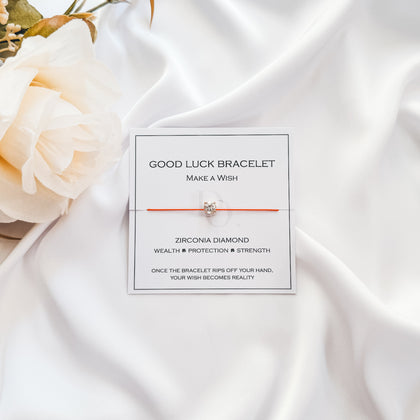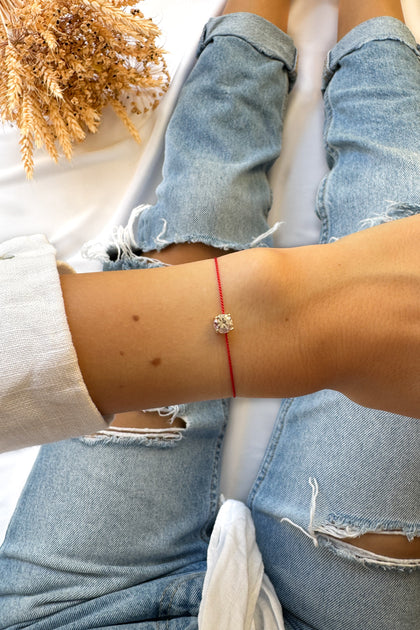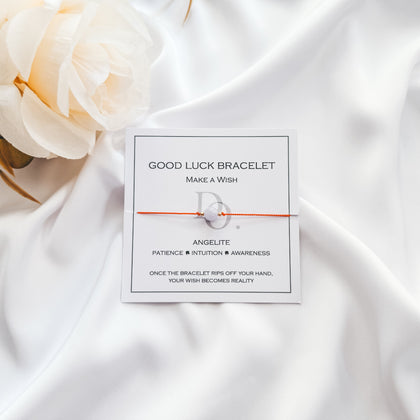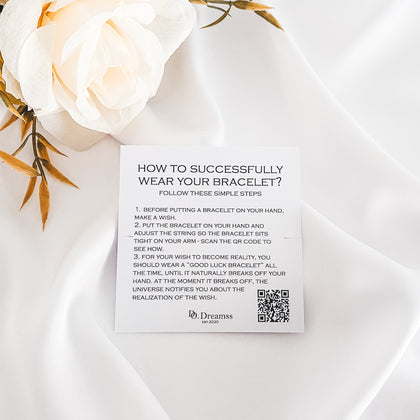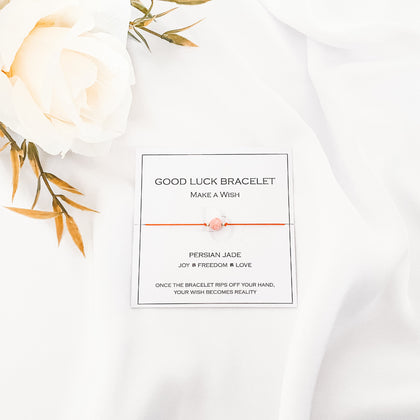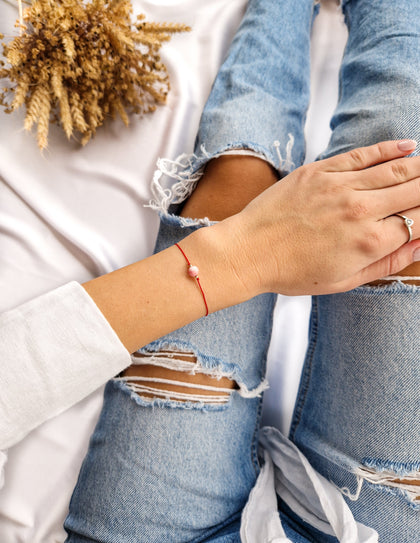The Lucky Edit by Do.Dreamss
7 Gifts That Bring Good Luck for Every Occasion
When celebrating life's milestones or supporting loved ones through new beginnings, we often search for presents that go beyond the ordinary. Gifts that bring good luck offer a beautiful combination of thoughtfulness, symbolism, and practicality that resonates across cultures and generations. These meaningful tokens carry centuries of tradition and positive energy, making them perfect for significant life events like weddings, graduations, new homes, or career advancements.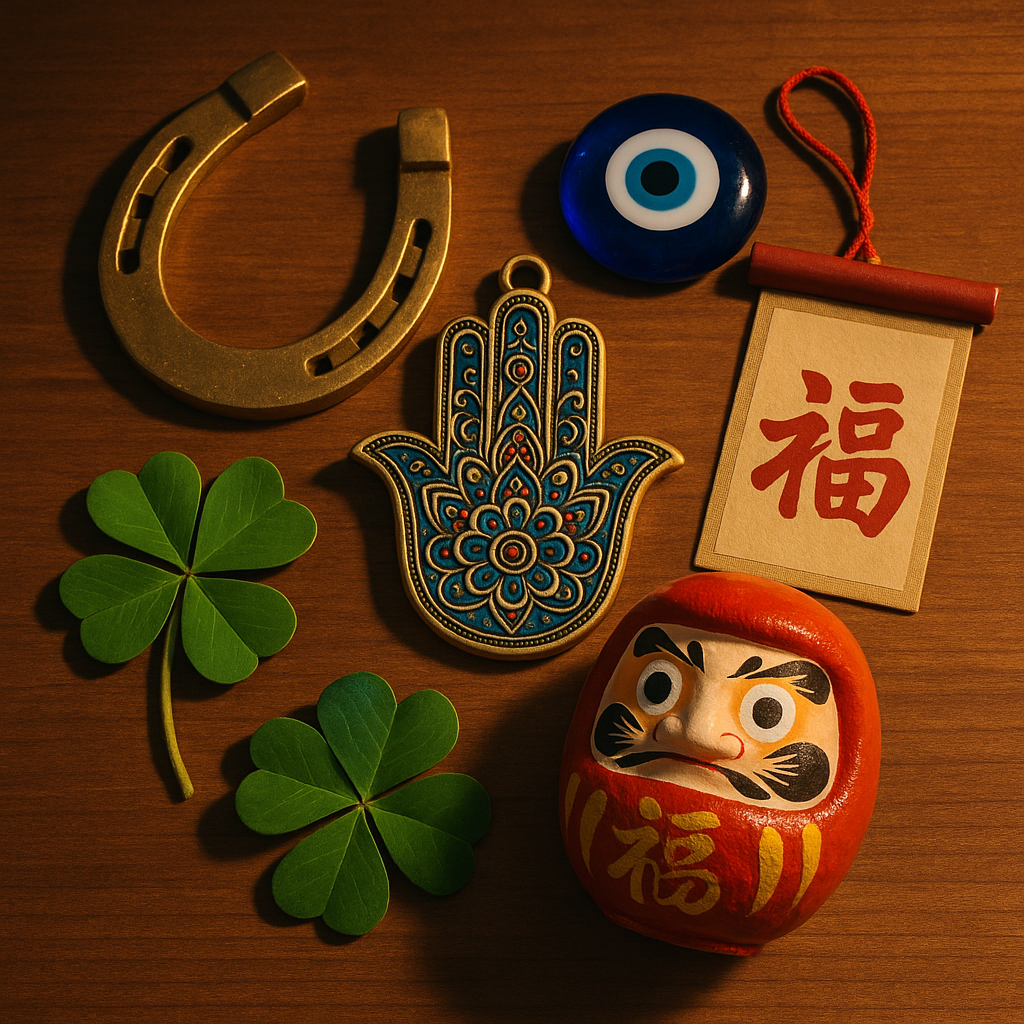
From ancient talismans to modern interpretations, lucky gifts serve as both emotional support and symbolic protection. Whether your recipient embraces superstition wholeheartedly or simply appreciates the sentiment behind tradition, these presents convey your deepest wishes for their success and happiness. Discover the world of Do Dreamss to explore how different cultures have cultivated unique symbols of fortune and protection throughout history.
In this guide, we'll explore seven categories of lucky gifts, their cultural significance, and how to choose the perfect token of good fortune for every important occasion in your loved ones' lives.
The meaning and power of good luck gifts
The tradition of giving objects believed to attract positive energy spans across nearly every culture and era of human history. These symbolic presents serve multiple purposes beyond mere decoration or utility—they provide psychological comfort, encourage optimism, and maintain cultural connections that span generations.
Eastern and Western traditions often differ in their approach to luck. Eastern philosophies like feng shui emphasize harmony with natural energy flows, believing specific objects and their placement can attract prosperity. Symbols like the Chinese Fu character (meaning blessing) or the Japanese daruma doll represent concentrated wishes for success. Western traditions often focus on protective charms against negative forces, from the Mediterranean evil eye to the Irish four-leaf clover.
Anthropologist Dr. Maya Henderson explains, "Lucky gifts operate on multiple levels—they represent the giver's sincere wishes, provide the recipient with a tangible reminder of support, and connect both parties to cultural heritage and shared beliefs about how the universe works." When we offer good luck charms to someone facing important life transitions, we're participating in an ancient human practice of mutual protection and encouragement.
Modern neuroscience even suggests these symbolic objects may trigger beneficial psychological effects. The presence of lucky items can boost confidence, reduce anxiety, and create a positive mindset that may indeed lead to better outcomes through improved performance and decision-making. This explains why athletes, performers, and professionals often maintain lucky rituals or objects before important events.
Classic good luck charms & jewelry
Wearable symbols of protection and fortune represent one of the oldest and most intimate forms of lucky gifts. These pieces carry their meaning close to the heart, serving as constant reminders of support and positive energy throughout the day.
The hamsa hand, depicting an open palm with an eye at its center, has protected wearers across Middle Eastern and Mediterranean cultures for centuries. Often crafted as pendants or bracelets, this symbol is believed to deflect negativity and the evil eye. Similarly, standalone evil eye jewelry features a striking blue glass bead that "watches back" at malevolent forces, making it a thoughtful gift for someone facing challenges or embarking on new ventures.
Western traditions have popularized the horseshoe (traditionally hung with ends pointed upward to "catch" good luck), four-leaf clover pendants symbolizing hope and fortune, and delicate wishbone necklaces representing fulfilled desires. Many jewelry for luck pieces incorporate lucky numbers—seven in Western cultures, eight in Chinese tradition, and three in many Nordic beliefs.
Contemporary designers have reimagined these ancient symbols into modern, wearable art.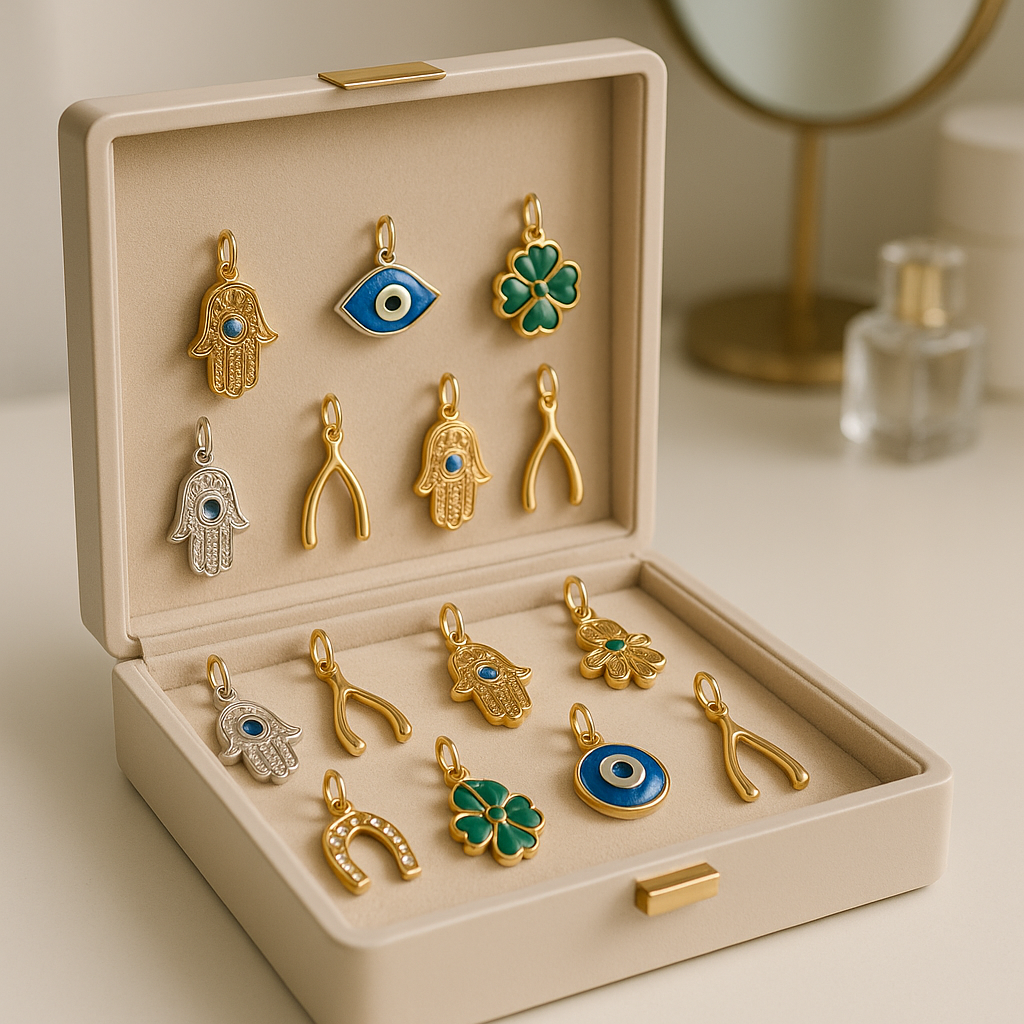
From minimalist gold evil eye studs to sophisticated hamsa cufflinks, these pieces blend protection with style. For milestone celebrations like graduations or new jobs, consider personalized pieces that incorporate birthstones alongside lucky motifs, creating a doubly meaningful gift.
When selecting lucky jewelry, consider both the recipient's personal style and the significance behind the symbol. A subtle clover pendant might suit a professional environment, while statement pieces work beautifully for artistic personalities. Explore what's new at Do.Dreamss to find unique, contemporary interpretations of classic lucky symbols that complement modern wardrobes while honoring ancient wisdom.
Plants and living gifts that symbolize good fortune
Living plants offer a unique dimension to lucky gifting—they grow and flourish alongside the recipient's new beginnings, serving as both symbolic and literal representations of prosperity and vitality.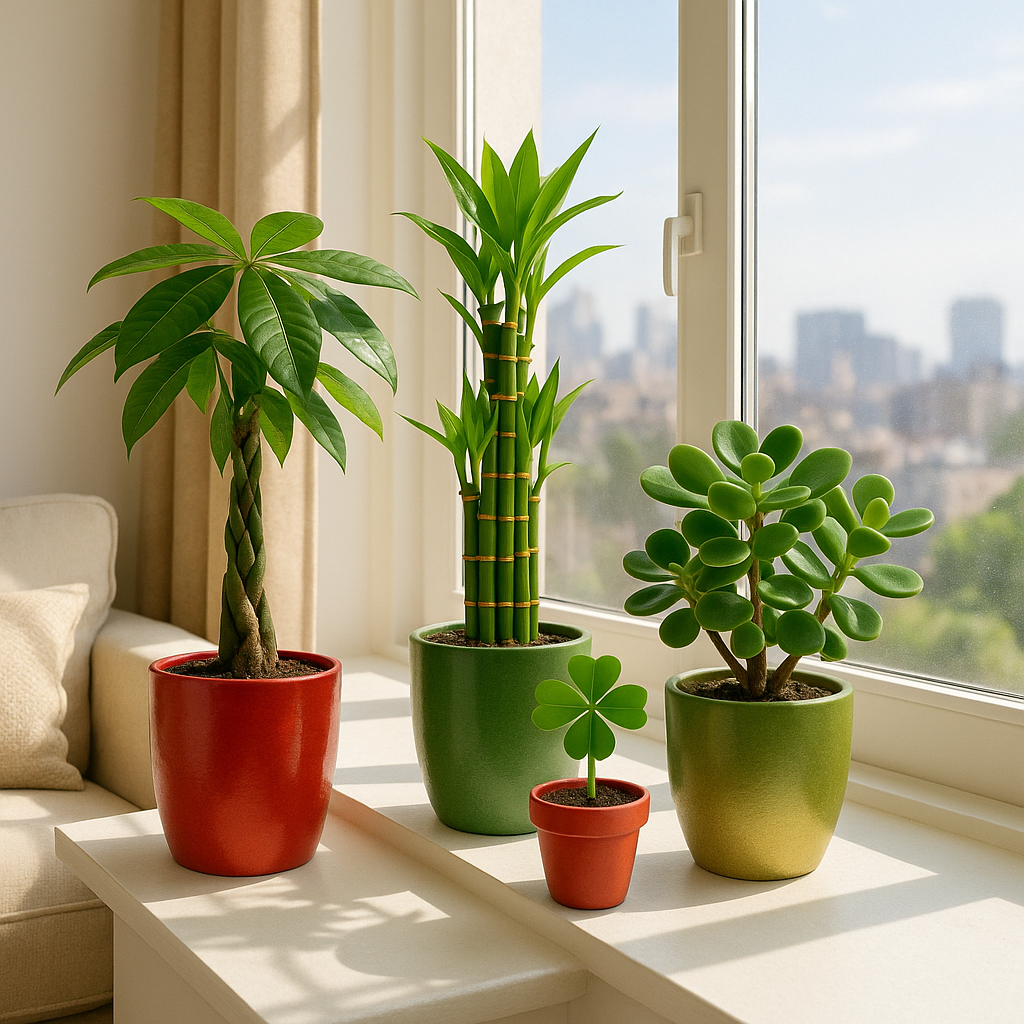
The money tree (Pachira aquatica) tops the list of fortunate flora, with its braided trunk and abundant leaves believed to trap wealth and opportunity. Feng shui practitioners recommend placing these plants in prosperity corners of homes or offices. Similarly, lucky bamboo arrangements—typically sold with stalks bundled in auspicious numbers—represent flexibility, resilience, and steady growth, making them ideal housewarming luck gifts or office warming presents.
Jade plants, with their plump, coin-shaped leaves, symbolize financial abundance across Asian cultures and require minimal care, perfect for busy recipients. For more traditional Western recipients, gifting a potted four-leaf clover plant creates both a conversation piece and a continuous source of lucky finds. Citrus trees, particularly those bearing round fruits like oranges, represent completeness and wealth in many traditions.
When presenting plants as good fortune symbols, consider accompanying them with care instructions and cultural context cards explaining their significance. The pot or planter can enhance the gift's meaning—jade or green glazes amplify prosperity messages, while red containers boost luck in many Asian traditions.
These living gifts carry particular significance for housewarming celebrations, business openings, and retirement parties—occasions marking new physical spaces or life chapters. For more ideas on thoughtful gifts for home and occasions, see our go-to blog for chic accessories featuring seasonal recommendations and care tips.
Home accents & decor for lasting luck
Decorative elements that attract positive energy can transform a space while silently working to invite prosperity and protection.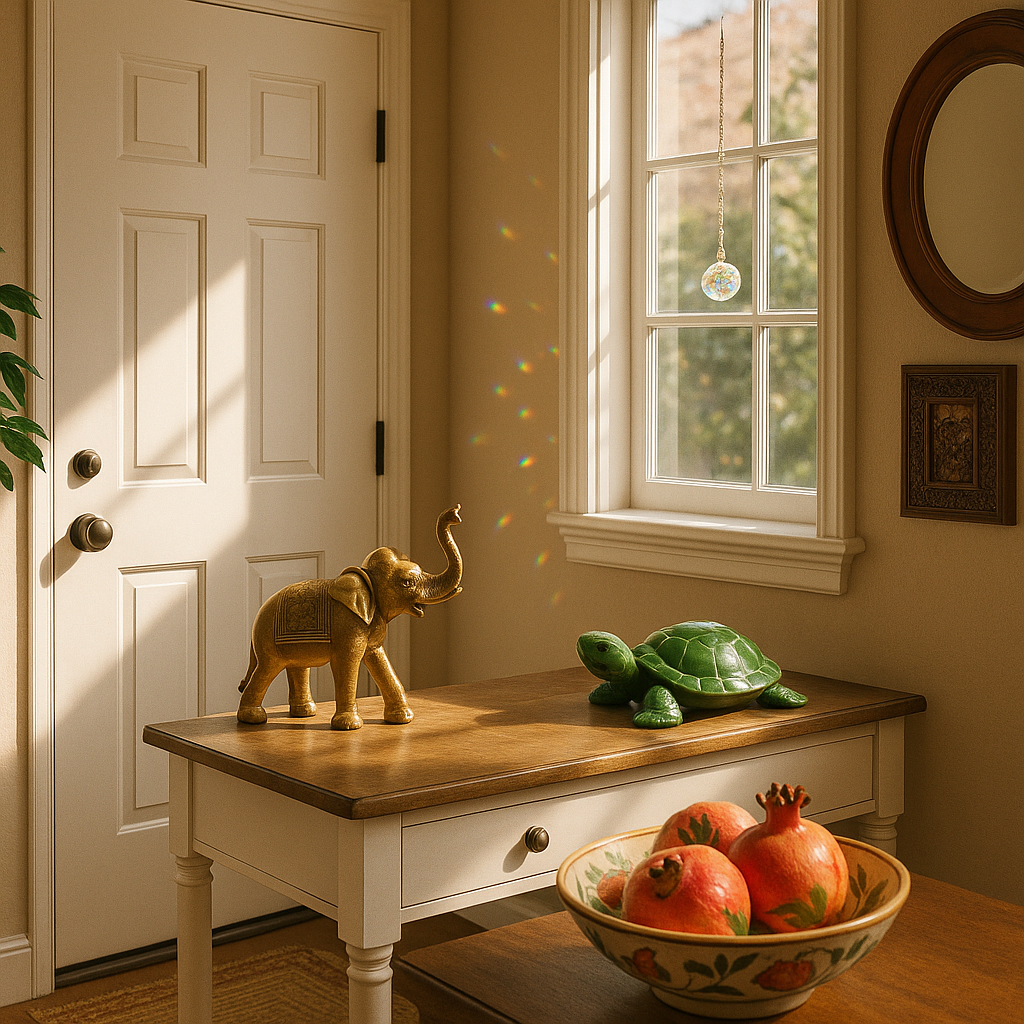
These meaningful home accents serve as both conversation starters and cultural touchpoints.
Elephant figurines with upraised trunks symbolize good fortune, wisdom, and strength across numerous traditions. Placement matters—facing doorways, these guardians welcome luck into the home. For water-element luck, turtle statues represent longevity, stability, and protection, particularly valued in East Asian households as symbols of support during life's challenges.
For those drawn to avian symbolism, peacock décor—from feathers to artistic representations—brings beauty, protection, and renewed prosperity. In many South Asian traditions, these magnificent birds represent watchfulness and abundance. Crystal suncatchers placed near windows not only create rainbows throughout the space but are believed to disperse positive energy while deflecting negative forces.
When selecting lucky home decor, consider the recipient's aesthetic preferences alongside traditional symbolism. Contemporary interpretations of fortune symbols—like abstract brass elephants or minimalist turtle sculptures—can complement modern interiors while maintaining their auspicious qualities. For kitchen-centric gifts, pomegranate-themed bowls or salt containers reference abundance and protection in Mediterranean traditions.
Caution should be exercised with certain items traditionally considered unlucky as gifts—clocks (which in Chinese sounds like "attending a funeral"), sharp objects like knives (which "cut" relationships in many cultures), or dried flowers (representing stagnant energy). Instead, focus on vibrant, life-affirming symbols that align with the recipient's cultural background and personal style.
For special milestones like weddings or major anniversaries, consider investing in heirloom-quality lucky décor pieces that can be passed down through generations. To find more unique decor gifts inspired by luck and positivity, explore the world of Do.Dreamss for contemporary interpretations of traditional fortune symbols.
Alternative ways to gift good luck
Beyond traditional charms and décor, creative approaches to bestowing fortune can make your gift particularly memorable and personalized. These thoughtful alternatives often combine symbolic elements with practical applications.
Carefully curated gift baskets provide a collection of smaller lucky tokens tailored to specific occasions. For graduates, assemble study essentials alongside symbolic items like acorns (representing potential growth) or a compass (guiding their journey). House-warming baskets might include bread (never going hungry), salt (preservation and flavor in life), and honey (sweetness and abundance)—traditional symbols across European cultures.
For tech-savvy recipients, consider digital fortune gifts like personalized e-cards featuring lucky symbols relevant to their heritage or beliefs. Subscription services delivering monthly luck-themed items keep the positive energy flowing throughout the year—from teas with auspicious ingredients to seasonal protective tokens.
Group video compilations where friends and family share their well-wishes and personal lucky charms create powerful emotional connections, especially for recipients facing challenges like medical treatments or competitive endeavors. These modern interpretations of communal support honor the tradition of community-based protection.
Simple objects from nature can carry profound meaning when presented thoughtfully—a found perfect skipping stone for someone taking chances, acorns for growth potential, or special coins from meaningful years. The key lies in the personalized story and intention behind these humble items.
For financial gifts or monetary presents (common for weddings and graduations), consider presenting them in luck-attracting ways—red envelopes following Asian traditions or accompanied by symbolic coins that shouldn't be spent. These thoughtful presentations transform practical gifts into meaningful good luck gestures.
How to choose the right good luck gift for any occasion
Selecting the most appropriate fortune-bringing item requires consideration of both the occasion and the recipient's personal beliefs and cultural background. A thoughtfully chosen lucky gift resonates more deeply when aligned with specific life transitions.
For graduations and educational milestones, focus on symbols of wisdom and opportunity. Owl figurines represent knowledge across many traditions, while key-shaped jewelry symbolizes unlocking future success. Consider the graduate's next steps—those entering competitive job markets might appreciate protective symbols, while those continuing education might benefit from concentration-enhancing tokens like clear quartz.
New job and career advancement gifts call for prosperity symbols placed strategically in work environments. Desktop items like small bamboo plants, success-attracting crystals, or subtle elephant paperweights provide encouragement without overwhelming professional spaces. For those working from home, lucky zoom backgrounds or desk arrangements following feng shui principles make thoughtful digital-age presents.
Housewarmings traditionally welcome protection and abundance symbols. Beyond plants and décor, consider practical items with lucky associations—breadmakers (never going hungry), salt lamps (purification), or wind chimes (dispersing negative energy). Many cultures have specific first-gift traditions—bread and salt in Slavic countries or rice and beans in Latin American traditions.
Wedding and relationship gifts benefit from symbols of harmony and union. Double happiness characters, intertwined designs, or pairs of mandarin ducks represent lasting partnership in Asian traditions. Consider the couple's shared heritage or the cultural background of their ceremony when selecting appropriate symbols.
When gifting across cultural boundaries, research specific taboos and avoid potentially offensive symbols. Numbers carry significant meaning—avoid the number four when gifting to East Asian recipients (similar to death in pronunciation) and be mindful of color symbolism (white representing mourning in some cultures while symbolizing purity in others).
The most meaningful gifts often combine practical usefulness with symbolic protection—a beautiful serving dish with subtle lucky motifs or quality tools engraved with protective symbols. This thoughtful balance ensures your gift brings both immediate joy and lasting positive energy.
Conclusion
The tradition of giving gifts that bring good luck represents one of humanity's most enduring and universal practices—crossing cultural boundaries and spanning centuries. These meaningful presents do more than simply decorate spaces or adorn bodies; they carry our deepest hopes for the recipient's wellbeing and success.
Whether you choose classic jewelry protection symbols, living plants that grow alongside new beginnings, or home décor that silently attracts positive energy, the intention behind your gift matters most. Each lucky token serves as a physical reminder of your support and well-wishes, providing both practical and emotional comfort during life's transitions.
Remember to consider your recipient's personal style, cultural background, and the specific occasion when selecting the perfect symbol of good fortune. The most meaningful lucky gifts seamlessly blend tradition with individual relevance, creating connections between ancient wisdom and contemporary challenges.
By understanding the rich symbolism and thoughtful application of these fortune-bringing presents, you transform ordinary gift-giving into an act of genuine care and protection. Your chosen token may become a treasured companion through your loved one's important life journeys—a tangible reminder of your support that continues working long after the occasion has passed.
Frequently asked questions
What is the best gift for good luck?
The best gift can vary by occasion and recipient; classics include lucky jewelry (clover, hamsa, evil eye), plants (money tree, bamboo), and symbolic decor (elephants, turtles).
Which plant is considered lucky for gifting?
Lucky bamboo and money trees are popular luck-bringing plants, believed in feng shui and other cultures to attract wealth and good fortune.
Are there any bad luck gifts to avoid?
Yes—knives, scissors, clocks, and dried flowers are seen as unlucky in many traditions. Always consider cultural sensitivities before gifting.
Do good luck gifts actually work?
While results aren't guaranteed, these gifts offer psychological comfort, positive energy, and thoughtful symbolism rooted in tradition.

